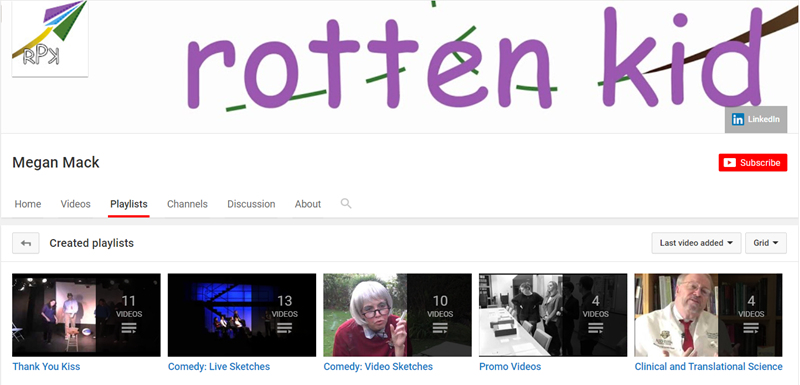
Episode 28: Megan Mack–Introverts and Improvisation
Category:introversion,Introverted Leadership,introverts,Leadership,PodcastPodcast: Play in new window | Download
Subscribe: Spotify | Amazon Music | iHeartRadio | Podchaser | TuneIn | Deezer | RSS
Episode 028 Show Notes: Megan Mack
Introduction
Megan Mack and Ben Woelk discuss the importance of improvisation exercises for introverts and building communication skills.

Key concepts
- Improvisation skills help introverts
- Improv is about listening and reacting
- Introverts can be amazing improv facilitators
- Ben’s Introverts and Leadership class includes an improvisation workshop
- Mirroring helps communicate with people in a way that’s more effective
- Improv helps you be more accepting of others’ ideas
- Work hard, try to be as confident as you can, and trust your instincts.
Quotable
The beautiful thing about improv, especially for introverts, is that it’s all about listening and reacting.
Introverts are such good listeners and they’re good followers. They build upon ideas. I think a lot of the time they have empathy; they have emotional intelligence.
Mirroring helps communicate with people in a way that’s more effective both for them and for myself.
Improv really forces you to think, Yes, I like your idea and here’s how we can try to make it work.
We get stuck in our heads, we stop listening and we think our ideas can be the only ideas or the best ones or the right ones.
‘Yes, and’ has been very important for me to understand, especially in leadership positions and you want to have a persona that is supportive of people and not setting an atmosphere where they’re afraid to advance their ideas.
Resources or Products Mentioned in this Episode
- WXXI
- Connections with Evan Dawson
- Second City Training Centre
- Rochester Brainery
- Writers & Books Literary Center
- Focus Theatre
- Alan Alda, If I Understood You, Would I Have This Look on My Face?: My Adventures in the Art and Science of Relating and Communicating
- Daniel Coyle, The Culture Code: The Secrets of Highly Successful Groups
- Rober Cialdini, Influence: The Psychology of Persuasuion
- Alan Alda Center for Communicating Science® at Stony Brook University
Links
- Episode 23–Tara Hughes: Impostor Syndrome
- Episode 27–Megan Mack: Empathy and Meaningful Discourse
- Follow Hope for the Introvert on Twitter
- Like my page on Facebook
- Support me on Patreon
- Get swag for Hope for the Introvert and Introverted Leadership at Zazzle
Transcript
Ben: Joining us today is Megan Mack. Megan Mack is an improviser, sketch comedy writer, and television and radio producer based in Rochester. She is a graduate of the Conservatory and Writing programs at The Second City Training Centre in Toronto, and has studied with Jimmy Carrane, Armando Diaz, Susan Messing, and T.J. Jagodowski and David Pasquesi. Megan performs with the sketch comedy and improvisation troupe, “Thank You Kiss,” and coaches improv and sketch comedy at the Rochester Brainery, Writers & Books, the Focus Theatre, and more. When she’s not on stage, Megan produces “Connections with Evan Dawson,” the daily afternoon radio talk show at Rochester’s NPR station, WXXI. She has also produced television segments for WHEC-TV, NBC Olympics, NBC Entertainment, and Seeten TV in Florence, Italy. I first met Megan at one of her improvisation classes at the Rochester Brainery. Since then, she’s conducted improvisation workshops for me for the STC Rochester Spectrum Conference and my Introverts and Leadership class at RIT. You can contact Megan at mac.megan01@gmail.com.
Ben: Welcome back, Megan. I’m glad you’re joining us again on the program. Today we’re going to talk about improvisation and communication and introverts doing improv, which almost sounds counter-intuitive in some ways. We had started the last time we spoke about how you had gotten started in improv and my first contact with you was attending one of your improv workshops at the Rochester Brainery. And one thing I probably have not told you about that is I refused to let my wife come with me because it was my first time doing improv, and I was afraid I was going to be an absolute idiot and I’ll do it the first time and I’ll just get through it. But I’ve thoroughly enjoyed it also and I’ve always enjoyed watching it and being part of the audience, but it in some ways it’s such a freeing type of activity, I guess once you get past your own head with it. Let’s talk a little bit more about what it’s like to be an introvert, yet you teach improv.
Megan: It’s as you mentioned in our previous segment, it can be hard for you to be up in front of a class sometimes and it’s very hard. The most difficult part of improv classes for me is starting the class, talking a little bit about myself and just talking about the basics of improv. Not that I’m uncomfortable talking about improv, but I don’t want to be me. Once we get into character work, I’m fine and I have a great time, but it can be intimidating, especially as an introvert to be up in front of a group of people and be leading the class .
Ben: Well and they’re all looking to you.
Megan: Right! Everybody’s looking at you.
Ben: Completely, especially at the beginning because–and one thing that you’ve done, is you just helped me with my Introverts and Leadership class I’m doing at RIT, and we’re going to get to do that again in the fall, which will be great fun. But some of the students shared that in all honesty, they almost didn’t sign up for the class because there was an improvisation workshop part of it, and at least one or two of them were really uncomfortable with being there. And eventually they relaxed. But you could certainly tell up front.
Megan: I hear that a lot, especially when I work with companies that ask me to come in and do team building exercises. But the beautiful thing about improv, especially for introverts, is that it’s all about listening and reacting. So the basic rule of improv is, you know, is say “Yes, and.” You want to agree to someone else’s ideas and build on them. But you can’t do that unless you’re actively listening. So I’m going to work off whatever you give me, and I know that you’re giving me something. We call it a gift or an offer in improv. You don’t have to put any pressure on yourself to come up with something because your team is there to support you, to have your back. So I was terrified in my first ever improv class. But once I realized we’re all here together, we’re all going to help each other and we all need to listen to each other and it got so much easier.
[bctt tweet=”The beautiful thing about improv, especially for introverts, is that it’s all about listening and reacting. @mmackmedia” username=”hopeintrovert”]
Megan: And I’m sure there are exercises that are more difficult than others. I can think of some that I still am not a huge fan of to this day and I’ve been doing this for more than a decade. But you can find the confidence within yourself because you know you’ve got a team around you and because introverts are such good listeners and they’re good followers. They build upon ideas. I think a lot of the time they have empathy; they have emotional intelligence. It can be a natural thing to be in an improv scene. It’s not about performing. It’s about reacting.
[bctt tweet=”Introverts are such good listeners and they’re good followers. They build upon ideas. I think a lot of the time they have empathy; they have emotional intelligence. @mmackmedia” username=”hopeintrovert”]
Ben: And I think that’s a really good point. And when we’ve, well one thing that we did, we kind of put together a syllabus for the class and with the exercises that we were going to be using, and there was no way I was going to share it with the class ahead of time because they would try to prepare for it. And the question came up, even with a team building that you’re going to be doing with us of, “Well, what exercises? What are we going to do?” I’m not going to tell you what we’re going to do because you’ll try to practice and be ready for it and it just does not work that way,
Megan: Right? It goes back to getting in your head. So if you’re trying to come up with scene ideas, or character ideas, or something to say when you’re standing on the back line watching a scene, you’re not actively listening. It’s better to go out there. I always tell students, go out there when you’re the most scared, when you have the most anxiety because you’re thinking the least. You’re so nervous that you’ll go out there and you’ll take whatever you’re given and you’ll build on it. It’s better than thinking, well, I haven’t been out there yet and I haven’t been really funny, but I have this old lady character that I know is going to work, so I’m going to go out there and play this old lady. This scene could be about a couple on a honeymoon. On a beach was this woman there. Now it makes no sense. I mean you could make it work, I’m sure, but the point is you’re not actively listening.
Ben: No, it’s not. It’s not a natural thing to make that work necessarily either. [Megan, “Right”] Yeah, it was really entertaining. The first session that I did with you, and I think I’ve done a couple with you there and we’ve done the other ones and I’ve even stepped into co-facilitating some improv at a conference, which was an interesting experience, too, because the guy I was partnered with was a hundred percent extrovert. I mean as extroverted as you could possibly be, and then I’m not, and just the mix in terms of how we worked with people, it was just–it was kind of crazy.
Megan: How did that go?
Ben: I think overall it worked. I had a lot of people who signed up for it because they trusted me and I felt very validated by it, but also felt like, “Oh, I need to make sure that my very extroverted friend doesn’t go totally over the top with things which he could do.” But overall it was a fun experience. It was tiring. It was two, two-hour sessions in two days as part of the conference activities along with everything else that was going on with it of course. And I really enjoyed it.
Ben: And part of what really got me excited about improv was Alan Alda’s book, If I Understood You, Would I Have This Look on My Face?: My Adventures in the Art and Science of Relating and Communicating, where he has spent this time with Stonybrook-Long Island and set up this Institute for helping science and medical professionals communicate, and just talking about how valuable that improv work is for them because they learn to be active listeners and they learn to empathize. And I kind of took that and looked at it and said, well how will that work for introverts? Because I feel like–well RIT, honestly, yes, we have that same type of personality types as scientists or medical professionals anyway, but in general, how would these same techniques work for improv?
Ben: And it was really exciting this last spring when we did our morning, yes, Saturday morning early improv session, which was a challenge for everyone there. But it was really exciting because you saw–I mean there were some struggles, definitely some struggles at times typically when they weren’t being physical enough in a scene. But in general, the follow-up survey I did, it’s like everyone nailed it. They all really loved you, but they all understood what they were getting out of it in terms of communication skills and that part was really, really rewarding. Honestly, it was a five week class. It was an online class. I had them read books, I had them write reflection papers, we did an improv workshop. I didn’t feel like I was working at all, because it was so much fun and I’m looking forward to being able to offer that again this fall as well.
Megan: I read the book that you mentioned after you told me about it. I zipped through it in two days. I learned so much from that book and one of the greatest things I learned was about mirroring. I’ve done the mirroring exercises before in my classes, but I thought I need to apply this more to my professional life and I have and it has just been so eye-opening for me, whether it’s noticing body language or vocal choices or just how someone is feeling. It’s really, really been beneficial.
Ben: Yeah, and found–I’ve been in another workshop and they did the mirroring and they did it for like 60 seconds and that was so hard, because you realize I really should not have had quite as intense an emotion I was trying to portray. To do that for 60 seconds–How much can you yell and shout? And it’s like, Oh my gosh, we still have 40 seconds left. But it was, it was interesting. So what did you find most helpful with the mirroring?
Megan: I think I’m pretty in tune with body language and how people are feeling a lot of the time. But there was a section of the book where they were talking about mirroring in a negative sense, and I think it was for salespeople. I’m not sure if you remember this and I can’t, I can’t quite remember what it was about. Fill me in if you do. But it felt kind of sneaky and dirty and wrong and just kind of trickster-type stuff, and I thought about it in terms of journalism and you know, you don’t want to bait and switch people, which–and we don’t do, but sometimes we get pitches from PR people that are not quite there and they try to sell you a bill of goods. And I think I’ve been able to communicate with people in a way that’s more effective both for them and for myself when it comes to knowing we have a shared goal to have someone on the show, but we want very different things out of it.
[bctt tweet=”Mirroring helps communicate with people in a way that’s more effective both for them and for myself. @mmackmedia” username=”hopeintrovert”]
Megan: So to try to help see that side a little better. I’m not implying that PR people are tricksters, but you know, I’m working from my own frame of reference, which they don’t have and they’re working from their own. So I think it’s helped me open my mind a little bit. But the way that this–I think it was a company that Alan Alda was talking about that was employing these techniques for negative purposes, like try to trick people by mirroring their body language or adopting their emotion so they can feel like they’re being listened to, they’re being heard, or they can relate to you better. And then try to sneak your way in, because I don’t like that at all. But the positive thing I took away from that was try to understand where someone’s coming from and meet them halfway.
Ben: Yeah. No, I would agree. And I do remember that part that you were talking about and it’s interesting because I do some workshops on temperament and what that means in terms of how you interact with people in the workplace. But as part of that, you also learn triggers, which can be very negative for people. And it’s almost like you have to have this, please promise, you’re just going to use this for good because you know now what this certain temperament type, what’s really going to impact them in a negative way. So giving you this information, but we’re trusting you to not be cruel with it in a sense. And there’s a Cialdini book called Influence: The Psychology of Persuasuion, which gets into a lot of this too. And it’s really kind of frightening because it really does talk about how we can be influenced towards certain things and just not have any sense at all.
Ben: And like so when you get into the mirroring and that could be used for that because, “Oh, I’ve had the connection with you now and now I’m listening and buy the brushes or whatever.”
Megan: You’re explaining it much better than I did, but yeah! [Laughing].
Ben: So what else do you find in terms of improv and how that’s, I mean have you thought about it more in the introvert context and around communication? Because you’ve been teaching these classes for a while and I kind of brought this, “Well what if we look at it like this and how that applies?” What do you find now? Are you more aware of how it works towards communication skills?
Megan: Yes, I think I am. I think I’ve learned that as a whole, people have a tendency to go to the know or to ask a question, and maybe you’re working on a project with your colleague, and they have an idea and you’re like, “Well that won’t work because X,” and improv really forces you to think, “Yes, I like your idea and here’s how we can try to make it work.” That’s been really the most beneficial thing for me.
[bctt tweet=”Improv really forces you to think, Yes, I like your idea and here’s how we can try to make it work. @mmackmedia” username=”hopeintrovert”]
Ben: Yeah. I’m very good at, “Oh, I know why that won’t work .” and learning…
Megan: You’re a problem solver, right?
Ben: Yeah. And it’s like, well, I wouldn’t even consider that, but then it’s like, no, I need to step back and that “Yes, and” part’s really important. Well, one for creating that open environment where people trust you and it’s safe for them to express ideas, but also because well I might actually be wrong and I need to hear these ideas out and wow, that was a great idea.
Megan: Absolutely. I’ve noticed how wrong I am in so many ways, [Both Laughing] thanks to improv, but we get in our own heads. We get stuck in our heads, we stop listening and we think our ideas can be the only ideas or the best ones or the right ones. And when you’re in a scene with someone and you have no idea what’s coming your way, you have to trust your scene partner and know that they’re trying to make you look good. That’s one of the biggest lessons I learned at Second City. Make your partner look good. It’s not about you. So if I go into a scene with you, Ben, and my goal is to help you shine and you have the same goal for me, then we’re going to do a great scene because we’re not being judgmental, we’re not being narcissistic, we’re there to support each other.
[bctt tweet=”We get stuck in our heads, we stop listening and we think our ideas can be the only ideas or the best ones or the right ones. @mmackmedia” username=”hopeintrovert”]
Megan: So I think you can translate a lot of that into a workplace or in social settings. You know, maybe you’re at a coffee shop with your friends, and you notice as an introvert probably would that one person’s not saying too much, or maybe they don’t feel included and you’ll try to create a situation in which you can draw them in, or you know, the next time they say something you “Yes, and’ it in your own non-technical improv way, but you bring them into the conversation. And I think that’s been really helpful for me.
Ben: I think that’s really cool. What suggestions would you have for people who might–for introverts who might want to become leaders or influencers? And I don’t want to cut off the improv conversation if we have more to talk about there, but I’m not sure what the next question would be. So any thoughts?
Megan: I’m kind of curious about your experience with improv and how it’s helped you, because you came to a Brainery class as you said by yourself, didn’t bring Marilyn and you came back and you brought her and now you’re teaching it on your own. So there’s something that must have been really triggering in a positive way for you. Some kind of light bulb moment where you thought, this is really helping me. This is really something that I can latch onto.
Ben: You know, it’s a really interesting question because I don’t know that I’ve stepped back from it enough to really think about why it is I think it’s important. Obviously I do, because I’ve included it in this Introverts and Leadership class and understand the techniques I think to some degree, but it’s why am I gravitating towards it besides watching Whose Line is it Anyway for however many years and that sort of thing and just thoroughly enjoying it. I think I’ve always–even though my temperament type, I think I’m supposed to be more of a planner, but I’m also able to change plans on the fly, and I think the improv is kind of like that also because you don’t know what’s coming next. But I think for me it’s a really tough question. I just don’t feel like I’ve thought it through completely, but I think the “Yes, and” part has been very important for me to understand, especially in leadership positions and you want to have a persona that is supportive of people and not setting an atmosphere where they’re afraid to advance their ideas.
[bctt tweet=”‘Yes, and’ has been very important for me to understand, especially in leadership positions and you want to have a persona that is supportive of people and not setting an atmosphere where they’re afraid to advance their ideas. @benwoelk” username=”hopeintrovert”]
Ben: And that part’s very important to me. There was another book by Daniel Coyle called The Culture Code: The Secrets of Highly Successful Groups and it was about high performing organizations and the cultures they built, and I’ve been part of governance bodies or boards in various organizations where that atmosphere was not there. They kind of hit all of the five dysfunctions of a board or however many of it is very well, and there was a lot of attempt to control around things, and I think I’ve become very sensitized towards that now and understanding that, especially in leadership positions, that I need to make sure that I’m giving everyone an opportunity to speak, to contribute, to feel–to belong really, I think is a large part of it. Now exactly how that translates back to going to improv. I found it–I just thoroughly enjoyed it. I enjoy the scenes. I enjoy some of the Goon River, you know, some of the other ones that we’ve talked about where you’re talking about this is the day you died.
Megan: You create a character and all of these characters live in the same town together and they all have happened to have died on the same day and all their deaths are interrelated.
Ben: And those were just so funny. In the session I did the one–second Brainery session I did with you where, I don’t remember what the name of the town was, but where the person next to me actually played–decided I’ll be the horse. It was really eye opening to me. It’s kind of like, “Oh wow, we don’t have to be people characters.” And so I remember when we did the one with the class, I was a flying squirrel.
Megan: I remember that. {laughing].
Ben: Named Rocky, of course, had to be. A flying squirrel, but just how much fun it was thinking about how that interwove with the other stories. You know, is was a kind of dark story, if I remember right, the way that one went.
Megan: I think so [laughing].
Ben: But in general, it’s just a lot of fun. I think I’ve, I like a sense, yes you are making it up as you go along, but you are working with people and you absolutely don’t know where things are going to go. And there’s a lot of freedom to that, because you’re not trying to reach a certain goal. And I think that actually is a big difference for me, because I have so many things that I participate in that are very goal oriented and to be able to just play and have fun and get outside my head in the sense of not thinking about what I’m going to look like once I got past the first time of doing it. And it’s like, “Oh this is no big deal.” But just the freedom of participating in something like that and seeing what kind of story you can build. So I think that’s what was the real hook for me. I’ve always loved it when the, some of the staging around the Whose Line and they would do the newsroom and all of that sort of thing and just how ridiculous it would get.
[bctt tweet=”Improv–the freedom of participating in something like that and seeing what kind of story you can build. @benwoelk” username=”hopeintrovert”]
Ben: I think that’s why I’m really enjoying it and for the class that I’m teaching, working with introverts and helping them understand what that means and that they have strengths, and some of that is introducing them to Cain’s Quiet book and things like that. It’s the first time they’ve read through the things and it’s like you see the light bulbs go on and more importantly than that, you see people who have felt hindered or have felt like they are in some sense of a strong word, “defective” in some sense or just not measuring up to everyone else. And being able to talk with them about what it means to be an introvert and to lead and how to be authentic, which is the other big piece of it. That has been tremendously rewarding and I think the improv work has helped a lot with that also.
Megan: I hear from a lot of first time students, I ask the question, what brought you here? What do you hope to learn? A lot of them say, “I don’t know why I’m here and I’m really scared.” And I say, “Thank you for being here. I hope you have fun. Just focus on having fun. “And at the end of the class I always check back in with people and they’ll say things like, “I didn’t know I could do that.” It’s in you, but because you’re so worried about how you’re perceived or what people could be judging about you, you get in your head. And I think one of the greatest rewards of improv, and this relates back to your class, when I helped with your students. At the end of that three hours or whatever it was, they could say, “I got up in front of people I didn’t know. I was in scenes that I had no idea was coming my way and I succeeded.” So if you can do that, you can get up and give a presentation of information that you’re already comfortable with. If you can do a scene where you’re a flying squirrel and people love it, you can give your next presentation about whatever it is you specialize in.
[bctt tweet=”Improv–I got up in front of people I didn’t know. I was in scenes that I had no idea was coming my way and I succeeded. @mmackmedia” username=”hopeintrovert”]
Ben: Well then I couldn’t figure out how to make the mime thing work, which was the other thing I had thought about. It’s like, “Nah, it’s too hard. We’ll do the flying squirrel.” Maybe one day of the mime. But it’s a very hard role to do for something.
Megan: Yeah. You have to rely on your body language.
Megan: And so yeah, overthinking what the possibilities are with that. So if we were looking at an introvert who wants to be a leader, wants to be an influencer, we’ve talked a lot about the improvisation techniques and I think given what we’ve talked about, there’s tremendous amount of value. I can’t imagine not recommending someone do improv no matter how terrified they are. But what would you see as the top things that an introvert should do who wants to become a leader or influencer?
Megan: I’d say the top thing is just be confident with who you are. And this is something that I’ve struggled with and I’ve come to realize is that you may be in a role that is perceived in a certain way. You are supposed to be this. If you are this, you’re supposed to be very outspoken. If you’re someone that’s on the radio or like that. I’m not, I know a few of my colleagues are not, but they’re good at what they do because they are who they are. So take those innate abilities, be confident in the unique skills that you have, and just “Yes, and” those to use an improv phrase. Just be confident with yourself and try to build your leadership abilities based on that. Because what’s the point of trying to be something you’re not? Then you feel more uncomfortable. You feel–you have impostor syndrome, you get in your head, you freeze up, you clam up and it serves the exact opposite purpose of what you want. So as I mentioned before, when I’m filling in for the host of the show, my job is not to be him. My job is to be me and do the best job I can. So it’s a learning curve. But being open minded, being competent and trusting yourself, those would be my top three.
[bctt tweet=”Just be confident with yourself and try to build your leadership abilities based on that. Because what’s the point of trying to be something you’re not? Then you feel more uncomfortable. @mmackmedia” username=”hopeintrovert”]
[bctt tweet=”Introverts as leaders–being open minded, being competent and trusting yourself, those would be my top three. @mmackmedia” username=”hopeintrovert”]
Ben: And being authentic is a big chunk of it.
Megan: Absolutely. And you mentioned that with scenes to an improv. If you play a character and you’ve never played a flying squirrel before, I’m sure, but you played it very authentically and I believed it and it was great.
Ben: What people don’t know! So in terms of that, and I actually think I pulled this off of your questionnaire, but I’m not sure, what is one thing about you that people would be surprised to know?
Megan: Hmm. I think for people that are not my very close friends might be surprised to know that I struggle a lot with insecurity and that stops me in my tracks multiple times a day. I think that would be, that would be it. Not–not it and there’s nothing else, but that would be the thing, because I’m sure after we finish talking, I’m going to overanalyze everything I said for a couple of hours and it’ll drive me crazy. And I wish that I didn’t have that part of me. But it’s there and it’s something that you try to work through.
Megan: And improv has helped me a lot when I’m really struggling, I turn on my improv brain and the judgy parts of myself go away. So I wish I could draw on that a little more.
Ben: You know, I appreciate you sharing that because I definitely have the insecurities too, and a lot of it has to do with who I’m dealing with and how I feel about that. And I am just as capable of feeling stupid and clumsy and everything else. And I think that is something–things like the improv, just getting out of your head and just doing what you need to do, or trying things and not being afraid to try things, I think is a lot of it and not worrying about failing in that sense. No, I can’t say I’ve mastered that lately either. So Megan, this has been wonderful. I’m glad we’ve had the opportunity to chat and you said overthinking things. I am going to be editing, so I’ll be…
Megan: I have a list of things I want you to remove, so we’ll chat. [Both Laughing]
Ben: Oh, I’ll bet. I’ll bet so. No, this has been a great conversation and I really appreciate you taking the time and very much looking to you on the next improv workshop that we do. Thank you.
Megan: Thank you for having me. I appreciate it.
Extras
If you’re an introvert, improv is an excellent tool to help get you out of your comfort zone and improve your communication skills. Thanks to @benwoelk and @RITtigers for the chance to work with this group on Saturday! pic.twitter.com/rvD1gnsaUF
— Megan Mack (@mmackmedia) April 15, 2019
















